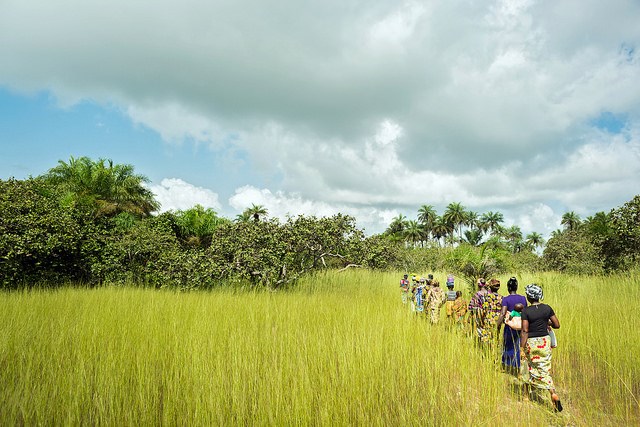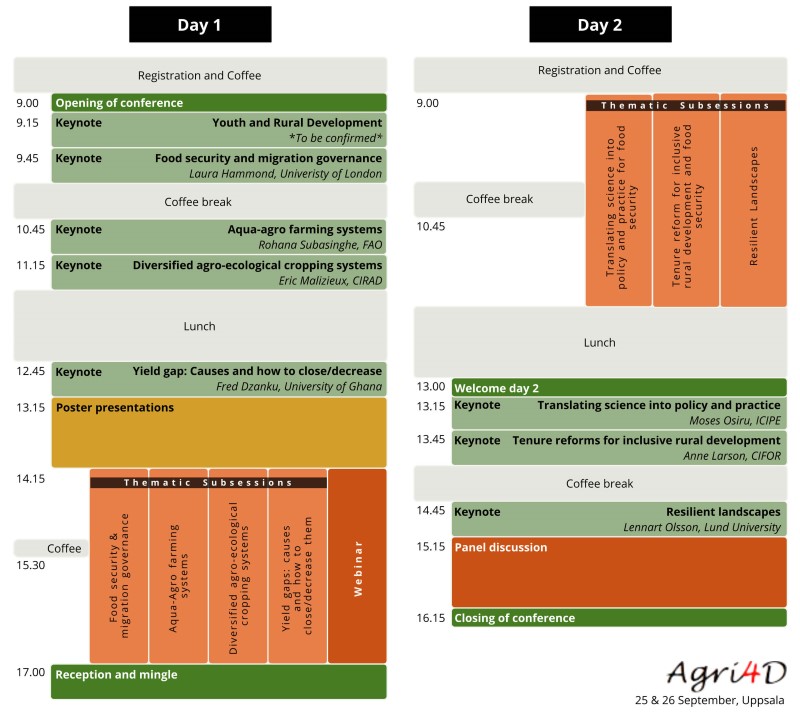Agri4D 2019: Call for abstracts extended to 22 May! Registration open!

Agricultural Research for Development Conference 2019 - Zero Hunger By 2030: Our Shared Challenge! Drivers of change and sustainable food systems
The Swedish University of Agricultural Sciences (SLU) and the Swedish International Agriculture Network Initiative (SIANI) are organising the Agri4D Conference 2019 that will take place at SLU, Uppsala on 25-26 September 2019. The main aim of the conference is to promote knowledge exchange for improved sustainability and resilience in food systems.
Keynote speakers
- Aslihan Arslan. Senior Economist, Results and impact division, IFAD
- Laura Hammond. SOAS Food Studies Centre, University of London
- Rohana Subasinghe . Aquaculture Management and Conservation Service FAO Fisheries and Aquaculture Department
- Eric Malezieux. Director Agroecological functioning and Performances of horticultural systems research unit (CIRAD)
- Fred M. Dzanku. Institute of Statistical, Social & Economic Research (ISSER), University of Ghana
- Moses Osiru. International Centre of Insect Physiology and Ecology (icipe), former member of RUFORUM; member steering committee AgriFoSe2030
- Anne Larson. Center for International Forestry Research.
- Lennart Olsson. Lund University. LUCSUS (Lund University Centre for Sustainability Studies).
Preliminary program
This is a two day event for researchers and professionals working with and/or interested in agriculture research for development. PhD students, senior scientists, experts from social, political, soils, crops, natural resources and animal science, economy, forestry, horticulture, veterinary medicine etc. are encouraged to participate. Abstract submission is open for:
- Presentations of results or ongoing activity in research.
- Presentation of networks, research groups or organisations.
- We welcome abstract submissions on issues related to youth in agriculture and/or gender in agriculture for all sessions.
Abstract submission instructions
- Limit your text to 300 words
- Font Times New Roman 12 points, single spacing
- Include a Title for your abstract
- Include authors and their affiliation.
- Include name of presenter and contact information
- Do not capitalise the letters in the title or authors, use sentence format.
- Avoid using bold letters unless necessary
- All abstracts should be submitted in English
- Abstracts should be based on one of the conference sub-sessions described below
- An author may submit up to two abstracts for two different sessions
- Submit your abstract at the link provided below, not later than May 22nd, 2019.
- The notification of acceptance/rejection of the abstracts submitted will be sent to you via e-mail by May 31, 2019.
Conference sub-sessions
- Translating science into policy and practice for food security
The knowledge base within the academic sphere is to a large extent an untapped resource that could be used within policy development and practice. Researchers’ evidence-based products can challenge myths, rumors, weak policy implementations and unsustainable practices. This is particularly evident in the area of food security. However, the translation of science into policy and practice is tricky. Here we are looking forward to contributions that highlights examples of how this process can be conducted. From plot level to global scale, failures or successes, requirements or warnings – we are welcoming all contributions.
- Yield Gaps – causes of yield gaps and how can they be smaller/closed?
Sustainable and ecological intensification are approaches to increase agricultural productivity and resilience. The general assumption is that regions where yield gaps – difference between potential and achieved yield – are large holds promise for productivity gains and increase in food security and rural livelihoods. We invite you to discuss the causes of observed yield gaps integrating biophysical and socio-economic analyses, and to explore options to bridge these gaps benefitting smallholders and the environment. E.g. research where panel data has been combined with remote sensing and detailed investigations in villages in SSA with focus on soils, management practices, labour and gender will be presented.
- Aqua-agro farming system: A sustainable solution to food security and nutrition?
Land and water resources are getting scarcer and the global food demand is increasing. Pressure on the farmers and researchers worldwide to adopt novel methods to maximize healthy food production and reduce/recycle waste is increasing. To reach the goals of Agenda 2030 of zero hunger, it is crucial to improve aquaculture through an integrated approach. We are looking forward to research contributions on sustainable aquaculture from all scientific fields.
- Resilient landscapes
Trees, forests and agriculture are key to reducing carbon emissions and assisting countries in adapting to the adverse effects of climate change. In addition, sustainable forest and land management provide essential ecosystem services that regulate both surface and groundwater flows. However, landscape management is complex and context-specific, it encompasses multiple objectives, stakeholders and governance levels. We welcome research contributions that elucidate the different aspects of management of water in the landscape in a flexible, adaptive and integrated manner and how water wise management and productive and multifunctional landscapes can contribute to achieving the 2030 Sustainable Development Agenda and the Paris Agreement.
- Tenure reforms for inclusive rural development and food security
This session will focus on the importance of recognizing and upholding tenure rights to land and other natural resources among rural communities. In many parts of the world, collective or community forms of land tenure are gaining increased recognition. But how do community tenure rights matter for inclusive rural development and sustainable food systems? And how can the formalization of existing customary tenure rights make a difference in the competition for land and resources with other actors? Or do even tenure rights risk being rolled back? We welcome papers from research, policy and practice to a dialogue around these issues to identify experiences and ways forward.
- Food security and migration governance
This session explores the multiple and overlapping ways in which human mobility and food (in)security interrelate. A dynamic food production sector at local, national, and regional levels will often include a significant mobile labour force, and households and populations exposed to food insecurity may use mobility as a counter-resource for longer or shorter periods of time. Contributions addressing the interplay between human mobility and food security are invited to take stock of some of these complexities, and to reflect explicitly on how policies for improving food security may be brought into dialogue with migration governance at various scales.
- Diversified agroecological cropping systems for sustainable food systems
Agroecology is the inter- and transdisciplinary study of the ecology of food systems, aiming to provide a system-level understanding of how biological processes, biophysical and socio-economic conditions interact and influence sustainability. Diversity in time and space is a key agroecological principle for designing multifunctional cropping systems, with potential to reduce pests and weeds and at the same time improve yields, resource use efficiency, soil fertility, biological control, livelihood and resilience of agroecosystems. Diversified cropping systems may also provide food for more diverse diets, and potentially strengthen local food security. We welcome contributions about all aspect of cropping system diversification and its role in food systems.
- Poster session
You are invited to submit an abstract to be considered for the poster session which will be held on the first day of the conference. PhD and Master students, researchers, senior scientists and experts are encouraged to submit abstracts about their research, programs, innovations, networks, or projects for presentation to a wide audience. Abstracts may address any topic relevant to the conference theme. Please note that all poster presenters are expected to do a short oral presentation.
Submit your abstract here
Register for the conference here!
Links:
For more information on the abstracts call please write to Agri4D-abstracts@slu.se
